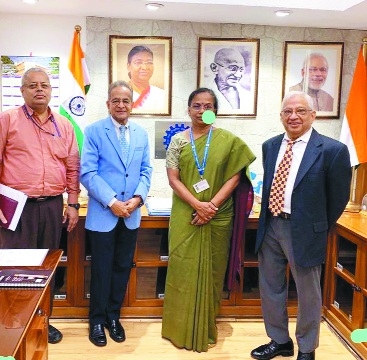Lithium can be extracted from reject seawater through desalination, claims Dr Kulkarni
Date :04-Oct-2022

Staff Reporter :
Dr Shrikant Kulkarni an 85-year-old scientist who got his Master of Science degree from Institute of Science, Nagpur in 1960 has developed a concept for extracting Lithium from reject seawater. He along with his colleague Suresh Babu communicated this to Council of Scientific and Industrial Research (CSIR) through letter. Impressed by the concept CSIR responded to the letter and invited both to India to understand from them in person. After listening to the concept CSIR has taken necessary steps and started studying it. Dr Kulkarni is in USA for the last more than 30 years but he is well aware of what his motherland has given to him so both he and his colleague Sureshbabu felt they should give back to their country. Dr Kulkarni, well known as Raja Kulkarni to his friends in the college days, joined Bhabha Atomic Energy Research Center for four years and then completed his PhD in Physical Chemistry from Illinois Institute of Technology in Chicago, USA. He was supported by assistantships and Fulbright Scholarship during his studies. Dr Kulkarni has worked in several areas of chemistry such as drug development, pesticide manufacture, environmental consulting and contract research for Environmental Protection Agency (EPA).
Presently, Dr Kulkarni is living in Raleigh, North Carolina. Along with his Chemical Engineering friend Dr Suresh P Babu, Dr Kulkarni disclosed concept of Lithium extraction from seawater to CSIR for possible research and development. To his surprise Dr N. Kalaiselvi, first woman Director General of CSIR, herself a distinguished Lithium Scientist, responded quickly and met them both. Dr Kalaiselvi not only has shown keen interest but has taken steps to circulate the concept write-up to CSIR scientists and experts in different laboratories with an idea to form a group for critical evaluation and to decide further action. Lithium is a very important component in the batteries work to power machines. Be it cellphone, laptop computers, electric cars, everywhere we need batteries and Lithium. Lithium is costly import in India. Common people are not aware of the source of Lithium. Mostly Lithium is mined from briny lakes which is not only a time consuming but costly too. South America, Australia, China and Africa are the largest producers of Lithium. Because of the increase in the usage and scarcity of Lithium research is underway in different countries to extract Lithium from seawater.
To explain a little on Lithium and the process that would be carried out to extract it from seawater Dr Kulkarni told ‘The Hitavada’, “The unique concept tries to combine India’s new desalination activities related to the plants near Chennai and Mumbai with established chemical manufacturing processes such as Solvay ammonia process and Haber-Bosch process to manufacture products like ammonium chloride (fertilizer), sodium bicarbonate, and soda ash. Seawater contains about 150-180 ppb (parts per billion) of Lithium chloride and nearly 3.5 % or 35 parts per 1000 of sodium chloride. The separation of Lithium and Sodium is extremely difficult because of the similarity of their properties. In the proposed concept the stepwise separation of the products allows the possibility of separation of minute amount of Lithium from sodium.” “Desalination process is basically an ultra-filtration which can remove about 50% of water as usable or potable from seawater due to the technology and legal limitations.
The remaining unfiltered water is returned to sea farther away from land or intake point to ensure maintaining the aquatic quality of seawater. The proposed treatment of reject water will also significantly reduce the cost of usable water from desalination plant thus improving the overall economic benefits. One of the proposed processes uses carbon-dioxide as a reactant. The use of carbon-dioxide from any power generating facility will minimize or eliminate the associated carbon footprint with Lithium recovery. The development effort will result in patents and marketable know how,” pointed out Dr Kulkarni. Dr Kulkarni and his US colleagues with years of valuable experience as research and training development professionals, are willing to devote their time to voluntarily work with CSIR process development researchers if they can take the lead to pursue the concept.